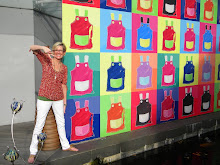Tuesday, July 12, 2016
After Thoughts: Eighth Sunday after Pentecost
Luke 10:25-37
Life is uncertain. Death is not. Its finality was abundantly manifest in these past few days. For those of us on the perimeter of the violence, we tremble. We mourn. And we ask a lot of questions. Why did these things happen? What can be changed? How can we stop this? Who is responsible? When and where will it end?
Questions tend to make us anxious – all that uncertainty can be scary. We want answers. So we rush to find them, sometimes in all the wrong places. There are plenty of suppliers willing to give us a fix. But this path only leads to a deeper addiction to a particular worldview that actually limits possibility and blocks a better future.
What if we could learn to dwell with the questions? To explore them deeper? To turn them inside out and upside down? Ask better questions, get better answers, so it’s said. But what if living with the questions is the path forward? Meditate on these words of Rilke for a moment:
“Be patient toward all that is unresolved in your heart and try to love the questions themselves, like locked rooms and like books that are now written in a very foreign tongue. Do not now seek the answers, which cannot be given you because you would not be able to live them. And the point is, to live everything. Live the questions now. Perhaps you will then gradually, without noticing it, live along some distant day into the answer.”
Jesus asked many powerful questions and the story of the Good Samaritan in this Gospel reading is a beautiful example. It seems fairly obvious from the conversation that the young man is confident of his proper observance of the law. He seems to be seeking assurance from Jesus that he is indeed righteous, an okay dude, guaranteed a seat at the big table in the sky. When he doesn’t get a definitive “yes,” he poses this question: “Who is my neighbor?”
Jesus, being Jesus, doesn’t do a Webster breakdown of the word and its origin. He doesn’t suggest a new set of criteria to use in identifying a neighbor. He doesn’t give a profile of who a neighbor is. Jesus tells a story. And at the end of that story, he asks his own question. “Which of these three do you think was a neighbor?”
Note the subtle difference. The man asks for help identifying who his neighbor is perhaps so that he knows the boundaries of this requirement. Jesus turns it all around and asks which of the three was a neighbor? Get it? Not who is my neighbor, but who is a neighbor by the action he takes. Jesus is telling him - “You are the neighbor. Just do that. Show mercy.” It’s not about the recipient of all that lavish love, unmerited forgiveness, boundless charity, or prodigal grace – we all absolutely do not deserve any of that. And that’s the point. God gives it to us anyway empowering us to give it to others. It’s all about us, the givers. We are the neighbor. We are the one called to be God’s agent, to have compassion, to show mercy. To everyone. Yes, everyone, today and every day.
Let us go, and do as the Samaritan did. And may we live together along that distant day into the answer.
Subscribe to:
Post Comments (Atom)

No comments:
Post a Comment